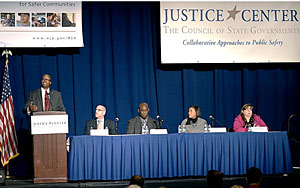
Administrator Listenbee addressed the Second Chance Act & Justice and Mental Health Collaboration Program National Conference on December 16, 2015, in Washington, DC. Seated left to right are David D’Amora, Daryl McGraw, Monique Marrow, and Lori Beyer.
Administrator Listenbee went on to discuss the ways in which OJJDP is working to reduce the number of children exposed to adverse childhood experiences who become involved with the juvenile justice system, the importance of detention facility personnel receiving trauma-informed training to enable them to accurately identify and respond to behavior, and the importance of equipping families and communities with adequate tools to help support youth during detention, upon release, and through reentry.
The plenary, “Treating With Care: Assessing and Addressing Trauma for Youth and Adults in the Justice System,” was moderated by David D’Amora, director of Special Projects for the Council of State Governments. Administrator Listenbee was joined by fellow panelists Lori Beyer, director of trauma training and lead trainer at Community Connections; Monique Marrow, a training specialist for the Center on Trauma and Children; and Daryl McGraw, associate director for the Office of Recovery Community Affairs at the Connecticut Department of Mental Health and Addiction Services.
The conference—cosponsored by OJJDP and the Bureau of Justice Assistance—took place on December 14–18, 2015, in Washington, DC, and brought together SCA and JMHCP grant recipients, experts in the field, and practitioners from around the country.
U.S. Attorney General Loretta E. Lynch provided the welcome keynote address while Karol V. Mason, Assistant Attorney General for the Office of Justice Programs, and other Justice Department staff moderated or participated in panels.
The JMHCP track introduced attendees to best practices associated with positive public safety and public health outcomes for people with mental disorders who are involved with the criminal justice system. Sessions on issues, including behavioral health and reentry, vicarious trauma and workforce development, trauma screening and assessment, and measuring family engagement and reentry processes for system-involved youth provided opportunities for cross-learning.
SCA session topics included promising approaches to maximizing resources, reducing recidivism, and improving outcomes for people returning from detention.
